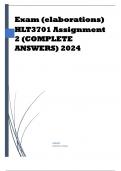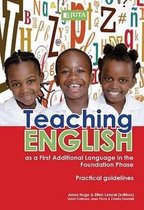Exam (elaborations)
HLT3701 Assignment
2 (COMPLETE
ANSWERS) 2024
ADMIN
[COMPANY NAME]
,QUESTION 1: (12) 1.1 Hill (2008) identifies different levels of
language development in young learners. 1.1.1 Discuss the
language development of learners who are at the Early-reading
level and explain how the knowledge of these stages will enable
teachers to assist learners in developing language in class. (6)
1.1.2 Create TWO (2) activities that you would use to develop
language skills for Early-reading level learners. (6)
STRATEGIES OF TEACHING READING
1.1.1: At the early-reading level, learners typically exhibit
emergent literacy skills, where they are beginning to understand
the basic concepts of reading and writing. They start recognizing
letters and their corresponding sounds, understand that print
carries meaning, and may attempt to read simple words and
sentences. Teachers armed with knowledge of these stages can
tailor their instruction to suit the needs of early-reading level
learners. By understanding where the students are in their
language development journey, teachers can implement
strategies that scaffold their learning effectively.
Teachers can facilitate language development in early-reading
learners by:
• Providing exposure to print-rich environments: Creating a
classroom environment filled with labels, signs, and books
helps immerse students in written language, allowing them
to become familiar with letters, words, and sentences in
context.
, • Engaging in interactive read-aloud sessions: Reading aloud
to students exposes them to a variety of vocabulary,
sentence structures, and storytelling conventions. By
discussing the story, asking questions, and making
connections, teachers help students develop comprehension
skills and expand their language abilities.
• Offering explicit instruction in phonemic awareness:
Phonemic awareness, the ability to identify and manipulate
individual sounds in spoken words, lays the foundation for
reading. Teachers can conduct activities like rhyming
games, sound segmentation, and phoneme manipulation
exercises to develop this crucial skill.
• Incorporating guided and independent reading experiences:
Guided reading sessions provide opportunities for teachers
to support students as they read texts at their instructional
level, offering guidance and feedback as needed.
Independent reading time allows students to practice their
reading skills autonomously, building fluency and
confidence.
• Implementing word study activities: Activities such as
word sorting, word hunts, and word building exercises help
students develop phonics skills and expand their sight word
vocabulary, enhancing their ability to decode and recognize
words in print.
• Fostering a love for reading: Encouraging students to
explore books for pleasure cultivates a positive attitude
towards reading and motivates them to continue developing
their language skills independently.
By employing these strategies tailored to the early-reading level,
teachers can create a supportive learning environment where





